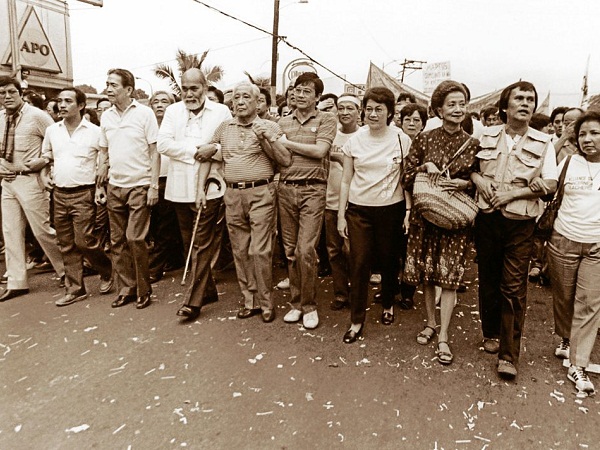
A PAGE FROM MARTIAL LAW HISTORY. Among the prominent anti-dictatorship protesters during the Marcos regime: From right: Etta Rosales, Behn Cervantes, Lily de las Alas-Padilla, Cory Aquino, Wigberto Tañada, Lorenzo Tañada, Ramon Pedrosa, and Ambrosio Padilla. INQUIRER PHOTO
Professors of the University of the Philippines (UP) Diliman Department of History issued a statement on Wednesday debunking claims that the martial law years under the late dictator Ferdinand E. Marcos marked the country’s golden age.
In the statement, the professors warned about the “deceptive nostalgia that never existed”—as the dictator’s son and namesake Senator Ferdinand Marcos Jr. is gunning for the vice presidency.
“The darkness of dictatorship descended upon the Philippines when Ferdinand E. Marcos declared martial law in 1972, and the dictator ruled the nation with impunity.”
“Great danger now lurks behind a deceptive nostalgia for a past that never really existed—that the Marcos years were a period of peace and prosperity. This is patently Marcos myth and deception. Under martial law, the country was plunged into a climate of repression and plunder and then into social crisis that exploded in the 1980s,” the statement read.
READ: DepEd urged to recall textbooks with ‘misinformation’ on martial law
The statement then proceeded to discredit some of the supposed benefits reaped under the Marcos regime with facts and figures. First, martial law enabled the birth of “crony oligarchy.” Under “constitutional authoritarianism,” the older Marcos was able to secure his hold to power.
It also debunked the claim that under the Marcos regime, the economy of the country prospered.
“Economic crises characterized the Marcos years, as economists have consistently revealed the most telling indicator was the extent of poverty. Poverty incidence grew from 41 percent in the 1960s to 59 percent in the 1980s. Vaunted growth was far from inclusive and driven by debt, which further weighed down on the nation. From 1970 to 1983, foreign debt increased twelve times and reached $20 billion. It grew at an average rate of 25 percent from 1970 to 1981,” the statement said.
The academics also hit claims made by Marcos supporters that the Edsa revolution has stunted the country’s growth to become the next Singapore. The statement also mentioned how civil liberties were curtailed during the regime.
“To say then that EDSA interrupted our becoming like Singapore is a big joke, a malicious lie. Marcos had mismanaged the economy; it was in shambles long before the Edsa revolt. From 1970 to 1980, among East Asian and Southeast Asian countries, the Philippines registered the lowest GDP per capita at 3.4 percent,” it read.
READ: To young Filipinos who never knew martial law and dictatorship
The statement ended with a call to the electorate to become discerning in choosing leaders in the upcoming polls.
“The sad thing indeed that could happen is to fall for the trap of seeking a better society from a mythical ‘golden’ past. In that past, Marcos myth-making served to hide the power grab and greed of a Malakas at Maganda. Today, Marcos deception seeks to evade accountability. We reject deception and demand accountability!” it read.
The statement was issued weeks after Ateneo professors slammed the younger Marcos for supposedly distorting history. The presidents of the 5 Ateneo universities also joined the call against Marcos Jr.’s supposed “whitewashing” of history.
READ: Ateneo professors slam Bongbong Marcos’ ‘revision of history’
“We, the undersigned members of the Ateneo de Manila community, vehemently oppose and condemn the ongoing willful distortion of our history. We deplore the shameless refusal to acknowledge the crimes of the Martial Law regime. We reject the revision of history, disturbing vision of the future, and shallow call for ‘unity’ being presented by Marcos Jr. and like-minded candidates in the 2016 electionsm,” the joint statement issued by Ateneo professors read.
Marcos is currently in a statistical tie with Senator Francis “Chiz” Escudero in first place in various preelection surveys. JE